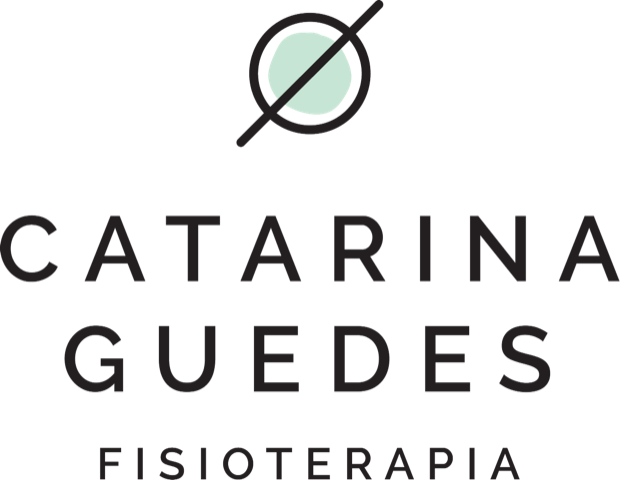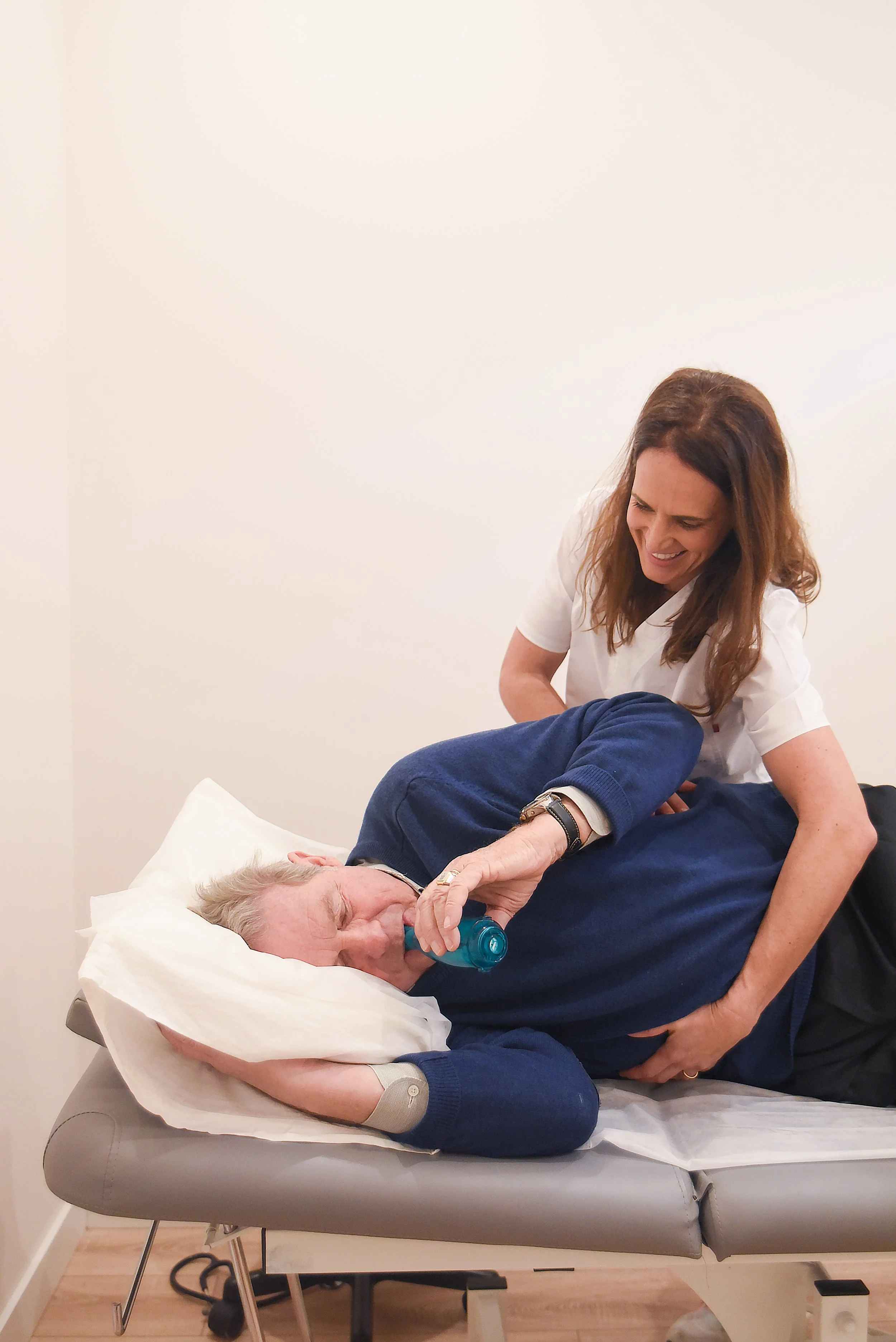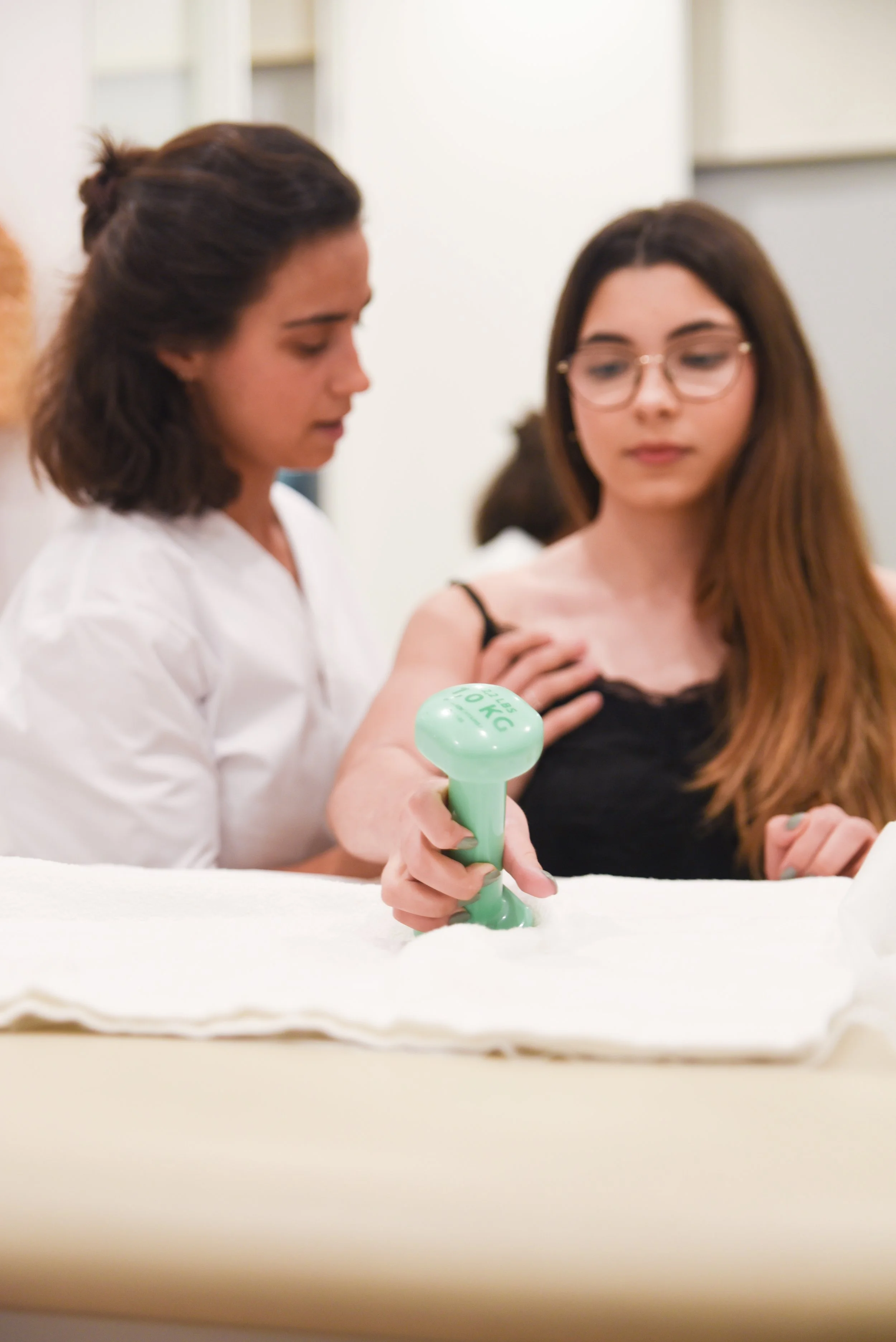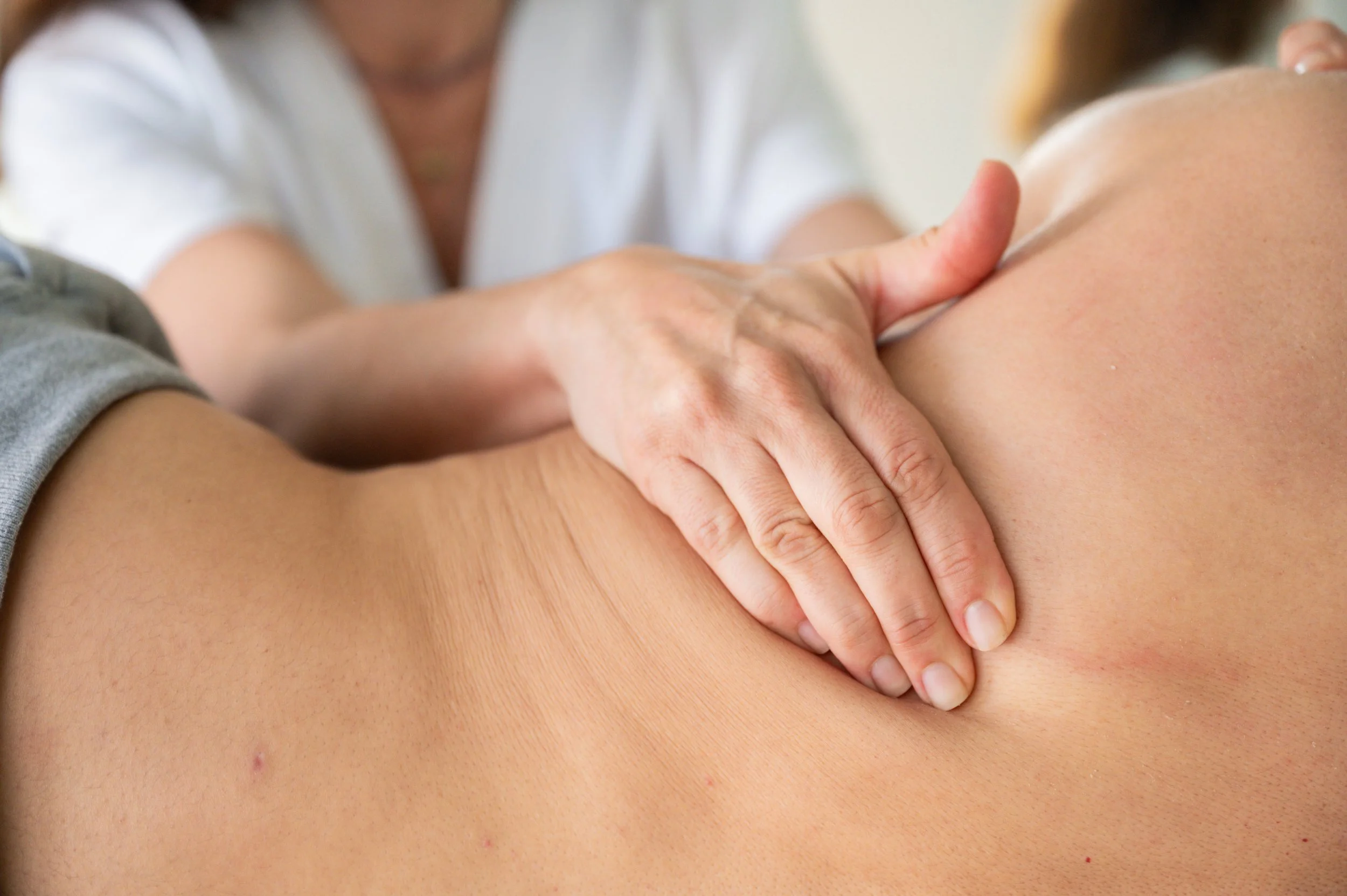Musculoskeletal physiotherapy
-
Musculoskeletal physiotherapy consists of the prevention, treatment and rehabilitation of any nerve, muscle, bone, tendon or ligament dysfunction, whether this is in acute, post-traumatic or post-surgical situations, or in persistent, chronic or postural situations.
In these situations, physiotherapy aims to restore balance and synergy between them, contributing to symptom relief, normal movement and consequently improved function and quality of life.
-
Common musculoskeletal injuries include alterations associated with the spine (cervicalgia, cervicobrachialgia, dorsalgia, lower back pain, hernias and disc protrusions...); joint dysfunctions; muscle and ligament injuries; trauma, pre- and post-surgical conditions as well as rheumatological conditions.
sportS Physiotherapy
-
Physiotherapy that works to promote physical activity effectively and safely, with the aim of preventing injuries and optimizing function, thus contributing to better sports performance in athletes.
-
This area supports anyone who practices regular physical activity or a specific sport; at any age or competitive level.
Any athlete, regardless of their level, who has an injury that prevents them from doing this should consult a physiotherapist in this area of intervention.
Injuries frequently associated with sports are:
Muscle or ligament injuries, tendinopathies, stress fractures, joint strains...
CLINICal PILATES
-
Clinical pilates is a form of therapeutic exercise based on conventional pilates, but applied to pathological situations or movement dysfunctions.
Clinical Pilates should be performed under the guidance of a trained physiotherapist. This therapeutic exercise is adapted to each patient's clinical case and readjusted as the sessions progress.
-
It is recommended for people with postural changes, spinal pathologies, joint instability and balance problems.
Clinical Pilates is used here as a basis for the progression of therapeutic exercises in musculoskeletal, post-surgical or postural injuries; as well as in cases of movement improvement in order to increase stability and postural control, avoiding relapses or new injuries.
When you have fully recovered from your injury, you can continue this therapeutic exercise in the studio next door, with group classes or with pilates machine work. With Marina Taborda Pilates Studio, we do interdisciplinary work, taking into account your injury, in order to obtain an adequate physical conditioning.
PEDIATRIC Respiratory physiotherapy
-
Pediatric respiratory physiotherapy essentially aims to facilitate the removal of secretions, improve ventilation and gas exchange, reduce respiratory effort and dyspnea (difficulty breathing), increase effort tolerance and quality of life.
The most common respiratory problems in childhood, such as bronchiolitis, pneumonia, asthma, atlectasis or even just upper airway obstruction caused by a common cold, benefit from respiratory physiotherapy treatments.
For proper assessment and treatment, the physiotherapist needs to have specific skills and advanced specialization in the area, as well as the appropriate means to assess and treat respiratory impaired children.
-
Pediatric Respiratory Physiotherapy should be sought when the child presents:
- Difficulty breathing
- Secretions
- Prolonged coughing
- Ineffective coughing
- Constant breathing noises
- Endless nights of persistent coughing
- Coughing that causes vomiting.
- Recurrent respiratory exacerbations.
- Difficulty managing food due to coughing fits
The conditions that benefit most from physiotherapy are bronchiolitis, atlectasis, pneumonia, pleural effusion, bronchial asthma, cystic fibrosis, respiratory infections of the upper and lower airways, neuromuscular diseases, cerebral palsy and post-surgical conditions.
In this area of intervention, respiratory physiotherapy uses different clinical assessment techniques in order to improve the child's general condition, reducing tiredness and the degree of obstruction, thus favoring restful nights and faster progress in the treatment of specific respiratory pathologies.
When treated early, respiratory physiotherapy also prevents a number of complications such as serious respiratory infections, breathing difficulties and sometimes hospitalizations.
CARDIO-RESPIRATORY PHYSIOTHERAPY FOR ADULTS
-
Cardio-Respiratory Physiotherapy is dedicated to improving the health, quality of life and well-being of patients with acute or chronic respiratory and/or cardiac conditions.
Intervention in this area is based on therapeutic physical exercise, education and counseling for health promotion and disease prevention. By improving your functional capacity, you will find it easier to meet the demands of everyday life.
-
Cardio-Respiratory Physiotherapy aims to:
- Reduce symptoms such as dyspnea - respiratory fatigue, fatigue, cough;
- Mobilize and help remove secretions;
- Reduce chest pain;
- Improve ventilation efficiency by reducing respiratory effort;
- Support weaning from mechanical ventilation and non-invasive ventilation (NIV);
- Maintain or improve effort tolerance;
- Improve functionality and quality of life;
- Increase self-efficacy in disease management;
- Reduce anxiety related to the impact of cardio-respiratory disease.
We work at any stage of the disease, and cardio-respiratory physiotherapy can be used either in acute conditions or in situations of prolonged respiratory illness.
Physiotherapy can be indicated from diagnosis, during the experience of chronic illness, in acute episodes or in palliative care.
Our contribution is aimed at the following areas of action:
- Respiratory failure
- Chronic obstructive pulmonary disease - COPD, emphysema
- Asthma
- Sleep apnea
- Post-covid or long covid
- Pre and post pulmonary or cardiac surgery
- Ventilated patient
- Oncological diseases
- Neuromuscular diseases
- Heart failure
- Other...
Cardiac Rehabilitation
-
Cardiac Rehabilitation increases the quality of life, self-confidence, functionality and social participation of people with heart disease through an exercise program.
Physical exercise is considered one of the fundamental pillars of a balanced life and has an impact on our bodies, with a particular influence on our heart health.
-
Cardiac Rehabilitation is indicated with the aim of increasing the autonomy of cardiac patients, whether they are patients after a heart attack, patients with heart failure, patients after heart surgery for valve replacement, heart surgery for coronary bypass, among others.
Sessions are carried out through individually supervised plans, with the option of psychological and nutricional counselling. This permits the control of further factores of cardiovascular risks.
Neurological physiotherapy
-
Neurological physiotherapy is a complex specialty that works to prevent and treat different neurological disorders. This area of physiotherapy focuses on movement impairment, postural control and functional alterations resulting from a neurological condition.
These changes in muscle activity often cause imbalance, lack of coordination, sensory changes, tremors and the loss of functional capacity.
The main aim of neurological physiotherapy is to provide patients with maximum functionality and autonomy, improving their quality of life, as well as that of their family and carers.
-
This specialty is suitable for anyone at any time in their life, whenever there is a neurological injury or illness, in the acute, sub-acute or chronic phase.
Treatment is individualized, with sessions tailored to the real needs of each specific clinical case.
Neurological physiotherapy works with disorders of the nervous system, such as:
- Cerebral Vascular Accident
- Traumatic brain injury TBI
- Parkinson's disease PD
- Vertebro-Medullary Injuries MVA
- Alzheimer's
GLOBAL POSTURAL RE-EDUCATION - RPG
-
Whether standing still or moving, the body maintains its posture through the constant action of static and dynamic forces in order to keep itself upright against gravity, respecting its physiological curvatures.
The ideal posture is one in which these forces support and guide the body without overloading it, with maximum efficiency and minimum effort.
This ideal alignment that keeps us upright, against gravity, throughout the day is achieved through powerful chains, the antigravity muscle chains. But this postural balance isn't always easy to maintain. We often overload our bodies with wrong positions, muscle asymmetries, inharmonious and repeated movements, which causes postural changes that are often associated with pain, muscle shortening and functional limitations.
Global Postural Re-education - GPR is a scientific method of assessing, diagnosing and treating pathologies of the neuro-musculoskeletal system, which aims to act on postural alterations by assessing and correcting the causes of each patient's symptoms.
This method promotes the global stretching of static muscle chains that are more shortened and asymmetrical, as well as the surrounding fascial tissues. These stretches are global and progressive, accompanied by the appropriate breathing technique.
-
Due to the possibility of adapting the treatment to each person and clinical condition, RPG can be applied without age limit, for some pathologies of the musculoskeletal system, in the acute or chronic phase, with or without symptoms, namely:
Global changes in mobility and muscle shortening
Herniated Disc
Disc protrusion
Lower Back Pain, Dorsal or Cervical Pain
Scoliosis, hyperkyphosis, hyperlordosis
Antero and Retrolistese
Sciatica
Changes in arm sensitivity - Cervicobrachialgia
Migraines
Dizziness
Muscle and joint injuries
Specific shoulder injuries
How does the treatment go?
Each session is individual, lasting around an hour and usually taking place once a week. During each session, a detailed assessment of your posture and body behavior is carried out, with the aim of correcting any changes found.
RPG requires active participation from patients.
The Global Postural Reeducation method is exclusive to physiotherapists who, after completing their degree, have begun training in Philippe Souchard's Global Postural Reeducation® method, certified by the Permanent International University of Manual Therapies in Saint Mont (France).
PHYSIOTHERAPY AT HOME
-
We’ll come to you!
We offer individualized and personalized physiotherapy care at home for all those who need our services but are unable to travel here.
All the necessary materials are supplied by us.
-
Any of the different clinical specialties described can be brought to you.
We would like to remind you that we have cardio-respiratory physiotherapists who specialize in invasive mechanical ventilation (IMV) and non-invasive mechanical ventilation (NIV), so we can make home visits to critically ill or palliative patients, even if they are ventilated.








